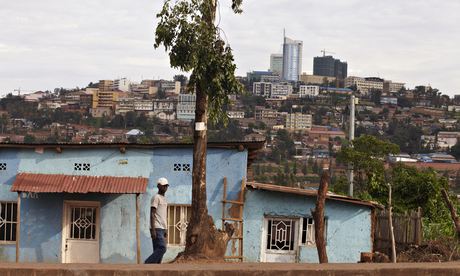There's only one dedicated guidebook on Rwanda and it thinks the capital is boring. "Kigali hasn't many tourist destinations," it warns, "you're unlikely to want to spend many full days there." Most tourists to Rwanda follow this advice, glossing over the city en route to the country's natural treasures: the Akagera savanna, the ancient Nyungwe jungle and the gorilla-rich Volcanoes national park. If people stop at all, it is usually to visit the Kigali Genocide Memorial Centre, regarded as one of the best museums in Africa.
It seems unfortunate that the city's main attraction should be linked to past atrocities. This month marks the 20th anniversary of the genocide, and over the years Rwandans have worked hard to define themselves by something other than suffering. The effort has brought Kigali a reputation for blandness and repression – roads are clean, plastic bags are banned, architecture is uniform – but beneath the reserved surface I find a luminous, musical city, as optimistic and welcoming as any in Africa.
At the Ivuka arts centre on my first day, I almost lean on a giant heart sewn together from scarlet condoms. The Ivuka is the centrepiece of Kigali's handful of galleries and workshops, and its programmes director, Charles Kizito, has a pertinent warning about his hometown:
"I've seen it again and again. Kigali calls people back. That's why I call it the 'mysterious magnet'," he says.
It isn't hard to believe. Judged on its setting, Kigali would be one of the most beautiful cities on Earth, ringed by mountains; hilly as bubble-wrap and overgrown with trees. Views across its valleys are best glimpsed from the back of one of the motorbike-taxis that swoop along streets and congregate in buzzing gangs at each corner. A driver hands over a spare pea-green helmet, twists the throttle just before you can settle in behind him, and the contours of the city open up around you.
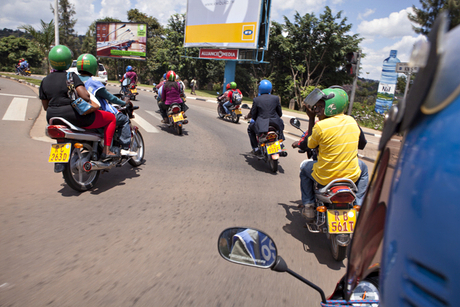 Kigali's speeding moto-taxis. Photograph: Tom Gilks
Kigali's speeding moto-taxis. Photograph: Tom Gilks
I begin my day in Kimironko, where a rickety covered market swells with produce at dawn. Miraculous avocados solve the problem of breakfast; some are the size and shape of dogs' heads, with flesh like a pale green butter. Restaurants serve them with unnecessary vinaigrette, a leftover from the Belgians who also introduced Kigali to brochettes-frites, kebabs with chips, effectively the local speciality. These are best at Republika in Kiyovu, but for a more indigenous spread the City Valley Motel in Nyabugogo delivers a frenzy of local dishes cooked "the true way", without oil. A white elbow of goat floating in red broth is carefully stripped of meat by my waiter and turns out to be sweet and delicious. There's a delicacy called sombe that tastes, at its worst, like the lovechild of spinach and soil. It's good here; garlicky and tough. Then there's mountain tea, steeped so long in honey and ginger that it pours thick as soup.
There are memorable restaurants all over town: Afrika Bite, in Kimihurura, is the best place for peanut chicken; then there's Heaven, a flashy gastro-chalet in Kiyovu. The tiny garden of the Gorillas hotel is rich with African stews, while Panorama Ten to Two is a funny old shack with a fine view and enormous chargrilled lakefish.
Behind the City Valley is Kigali's minibus hive. To find one going in the right direction, look out for the conductor, he'll be leaning out of the window and slapping the roof, yelling the name of the destination. No journey within the city costs more than 100RWF (9p) and, shoehorned in with 18 other people, it's a good way to make friends.
Everyone is keen to tell me about Kigali's future but a history lesson is harder to come by, and it's telling that Kigali's Natural History Museum is one of the emptiest, trippiest natural history museums ever: its star exhibits are a collection of miserable pet snakes and an ill-stuffed crocodile grinning at the pair of shoes dug from its belly.
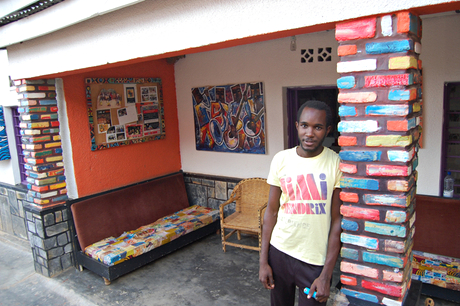 ‘Kigali is a mysterious magnet’ … Charles Kizito outside Ivuka Arts. Photograph: Kit Buchan
‘Kigali is a mysterious magnet’ … Charles Kizito outside Ivuka Arts. Photograph: Kit Buchan
A better insight into the city's backstory comes from an eccentric walking tour offered by a group of local women from Nyamirambo, the Muslim quarter. This sleepless maze is the city's multicultural heart, older than Kigali itself and peopled with migrants from across the continent.
My guide, Marie Aimée Umugeni, introduces me to her neighbours as we go: milk-sellers, mechanics, drapers, chapati-makers and musicians. Explaining the history and ethnic variety of her district, and its stubborn refusal to be redeveloped, she makes me aware of the current trends in tailoring from Senegal, and laughs in the doorway of a "saloon" as a Congolese braid is dextrously but forcibly roped into my hairline.
Beyond Nyamirambo, the road turns to cobbles and clay as it weaves up the slopes of Mount Kigali. The summit can be reached in half an hour and gives an uninterrupted panorama of the plains and mountains to the west, where the Nyabarongo river flows across Rwanda to Lake Victoria and the Nile. Bikes can be hired to tackle these outer landscapes, and there's a riding stables that sits in splendid isolation on the hilltop, run by rich Belgians and staffed with imported steeds.
Turning back east, the whole city is heaped neatly over the hills. I am struck by what a small and strange place it is, but how attached I already feel to its resilience and ambition. Just over a million people are contained within this view – the same number that died in the genocide and its auxiliary massacres. It is incredible, not only for the unfathomable scale of the cruelty, but the extent of the healing since.
Steep paths down the hill pass through villages studded with tiny bars. Children tut cheerily and offer little fists. If you sit and drink, their parents expound their hopes for the changing city. No one is desperate or starving, and although this part of Nyamirambo is considered a slum, it has the feel of a sheltered village, safe and slow.
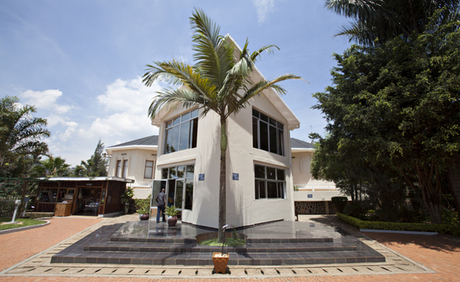 The Kigali Genocide Memorial. Photograph: Tom Gilks
The Kigali Genocide Memorial. Photograph: Tom Gilks
Everywhere, in fact, is safe. No other capital city in east Africa can be navigated so widely, at any hour, without harassment, allowing Kigali's nightlife to be greedily explored. At dusk, as bats ribbon overhead, music can suddenly be heard from pockets all around the city. At the Gakondo Group's barnstorming Friday residency at the Hôtel des Mille Collines (of Hotel Rwanda fame) I am given a stirring insight into traditional Rwandan song and a rousing way start to my evening. The bandleader, Massamba Intore, tells me about the importance of music to his city: "We cannot reconnect our people through speeches or through conferences – only through our music. It's the only way we will recognise our identity."
An hour or two spent at the Executive Carwash, in Kimihurura, confirms Massamba's views on the power of music. This bar, beside a highway and hidden by a low wall, is a kind of open-air dancehall, loud and vivid and divided into rickety, slipshod segments. Nyama Choma – Kenyan grilled lamb – turns all night on the enormous barbecue, to be washed down with Primus and vin-de-banane, while a crowd dances under the stars to the polyglot jumble of songs. It may be the best bar I have ever seen. It is also, literally, a carwash.
Up the hill, the Sundowners bar thumps with Ivorian reggae and serves Boilo, a meat-and-banana stew that supposedly prevents hangovers. Across the valley in Ti Amo, local R&B stars like the commanding Dr Claude and the heartthrob Bruce Melodie splice with Drake and Beyoncé. A big Rwandan chorus sings and drums at the scruffy Divinity bar in Remera and Congolese rhumba is everywhere, from the glossy New Papyrus to the glitzy K-Club. Every bar is a mass of nationalities, Cameroonian, Burundian, Tanzanian, Belgian, Congolese, not to mention the Rwandans who were born or lived much of their lives in Uganda, Zambia or Malawi. I find it hard to believe this is the same city that is sometimes called "un-African", or "Africa-lite".
On my last afternoon I walk around Nyarutarama lake; a small body of water set in a tangle of quiet parkland behind the corporate district. Malachite kingfishers burst from one bank to another like blue beads across an abacus, a great white pelican crashes into the surface and sails out of sight, while above the trees drift the huge flocks of black kites that make Kigali their summer home.
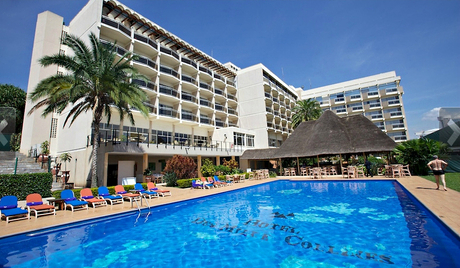 Hôtel des Mille Collines, where the film Hotel Rwanda was set. Photograph: Tom Gilks
Hôtel des Mille Collines, where the film Hotel Rwanda was set. Photograph: Tom Gilks
The wild jungle canopy, the weird and magical Lake Kivu and the famous gorillas are all a short drive away; for a country not much larger than Wales, Rwanda has more than its fair share of grand surprises. In its own small way, though, Kigali is one of them: a city that doesn't court attention, but generously rewards it.
KIGALI: CITY DIRECTORY
The Kigali Genocide Memorial Centre ( kigaligenocidememorial.org), in Gisozi, requires a full day to take in. Entrance to the centre is free but donations are encouraged.
The City Valley Motel (+250 252 515741, no website) is on the corner of KN 7 Road and KN 8 Street (on Avenue des Poids Lourds), behind the Resident Hotel. Lunch is best during the week, when the kitchen cooks a wider variety of dishes. Arrive before midday to ensure you get a table.
Heaven (heavenrwanda.com), on KN 29 Street in Kiyovu, is one of the few restaurants requiring a reservation – which you can make online.
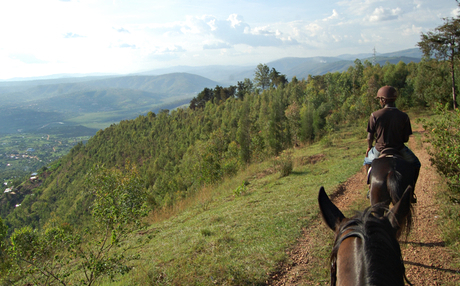 Fazenda Sengha horseback ride Photograph: Kit Buchan
Fazenda Sengha horseback ride Photograph: Kit Buchan
Fazenda Sengha (call +250 784 406 340 for directions, sengha.com), atop Mt Kigali, is the only riding stables in Rwanda. Trail rides are pricey (£22) but a lovely way to see scenery and birds.
Hotel Gorillas (+250 252 50 17 17, gorillashotels.com), and its restaurant Le Dos Argente (The Silverback), is on the corner of KN 41 Street and KN 51 Street in Kiyovu.
Ivuka Arts (ivukaarts.com) is on KG 573 Street in Kacyiru, behind the Umubano Hotel. Other art centres/workshops nearby include Inema Arts and Ishyo Arts Centre.
Walking tours are given by the Nyamirambo Women's Centre (nwc-kigali.org), on KN 132 Street opposite Biryogo Market. Tours begin at around 10am, cost around 15,000RWF (£13) and can be arranged to include a cookery lesson.
The Natural History Museum (museum.gov.rw) is housed in Kandt House, a rare colonial-era building that is down a side-road and beside the prison on KN 2 Avenue. Entrance costs £5.30 and also includes a short tour.
Hôtel des Mille Collines (+250 252 576 530, millecollines.net) served as a refuge during the genocide, a story that is told in the film Hotel Rwanda. Traditional music plays every Friday 7pm to 10pm. Entrance costs £9 but is redeemable at the bar.
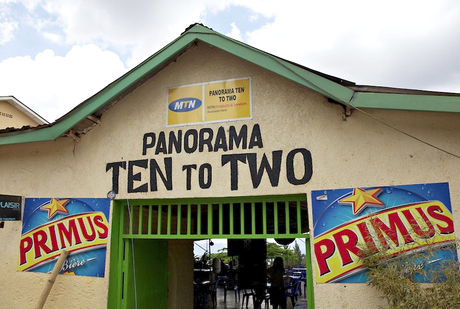 Panorama Ten to Two. Photograph: Tom Gilks
Panorama Ten to Two. Photograph: Tom Gilks
Panorama Ten to Two (+250 788 831 878, no website), is set back from KN 22 Avenue, beyond the Nyamirambo stadium and a few doors down from the Baobab Hotel.
Kimihurura Executive Carwash (+250 788 826 195), the bar in a carwash, or if you prefer, bar-wash, is on KN 7 Road, the road dividing Kimihurura from Kiyovu.
Sundowners Bar (+250 788 413 796), New Papyrus (papyrusrw.com) and Afrika Bite (+250 788 685 184) are all just off KN 672 Street, Kimihurura's main drag after dark.
Further afield, K-Club (k-clubrwanda.com) is on KG 9 Avenue in Nyarutarama, Rwanda's smartest suburb. Rumba, zouk and ragga night is every Thursday, and admission is free.
Bike hire from Rwandan Adventures (rwandan-adventures.com). Tours range from daytrips to 10-day missions.
Getting there
• Turkish Airlines (turkishairlines.com) and KLM (klm.com) fly to Kigali via Istanbul and Amsterdam respectively. Both start from around £550 return
